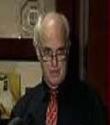Revolution began life as a simple word, describing the completion of a circuit. In those pre-Copernican times, lexicographers used the example of the Sun completing its “revolution” around the Earth. By the middle of the 18th century, the Earth now completed its “revolution” around the Sun, but European dictionaries also defined the word as a “change in the state of a government or country.” The Académie Française’s 1768 edition referred to the “memorable and violent changes that agitate” a country; the “revolution” of a given country was “the most memorable” change, “which brought in another order.” The Académie waited until its 1835 edition to admit that meant 1789 in France. Émile Littré, in his 1872 French dictionary, took a far more unequivocal stance: for a Frenchman, the revolution meant “the first revolution, the great revolution, that of 1789.”
Revolution: The search for a new future
By-James Collins
Opinion
00:08
Thursday ,30 August 2012

“Revolution” means more than a brusque or violent change in the government of a State. Antoine Furetière, in his 1690 Dictionnaire universelle, suggested a key secondary meaning: “Revolution” means a change in our spirit, “brought about by the inconstancy of our passions.” Littré took the final step on Furetière’s path: “In an abstract manner, the revolution (is a) system of opinions composed of hostility to the past and of the search for a new future, by opposition to the conservative system.”
Is Egypt living through Littré’s revolution, or just the old-fashioned violent change of regime? The mainstream media has always been reticent to speak of revolution. In early February 2011, even Al Jazeera used the rubric “Crisis in Egypt.” When Georgetown’s Center for Contemporary Arab Studies organized a round-table on “The Unpredictable Present: Reflections on Revolution,” C-Span broadcast it as “Political Unrest in Egypt and the Arab World.”
What did we mean by “revolution?” Osama Abi-Mershed put it succinctly: what we were witnessing in Tunisia and Egypt was “fundamental and paradigmatic change […] sweeping away not only political regimes but a particular world view.” That’s Littré’s definition — not simply a change of regime or even a modification in the structure of government, but a change in world view.
I would identify two key changes that define revolution in Egypt: Egyptians have decided to stop living the lie, and Egyptians are no longer willing to live in a political system based on fear. Vaclav Havel, the Czech playwright and dissident who led the Velvet Revolution in his country, and became its first post-1989 president, explained this process in his classic essay, “The Power of the Powerless.” The first step in destroying a post-totalitarian state, based on fear, is to stop living the lie — the lie that someone like Hosni Mubarak was “elected”; the lie that Egypt, prior to February 2011, had a legitimate government; or the lie that Egypt’s government served its people, not their rulers.
Between December 2010 and March 2011, Tunisians, Egyptians, Libyans, Bahrainis and Syrians stopped living the lie; they collectively decided that they would no longer be ruled by fear. In Egypt, so long as the Supreme Council of the Armed Forces claims to make law, the lie lives on, with one revolutionary difference that some of the SCAF’s leaders have not grasped: the Egyptian people openly recognize the lie as a lie.
As a revolutionary act, the recent dismissal of Hussein Tantawi, Sami Anan and their colleagues is far less important than President Mohamed Morsy’s rejection of the blatantly fraudulent “constitutional” changes imposed by the SCAF. He has spoken the truth: the council never had any legitimate right to make constitutional law. Morsy has taken the first step down the path of legitimate constitutional government; next, he must oversee a just process for the writing of a real Egyptian Constitution and for the election of a real Parliament. As an elected president, he has the moral and legal legitimacy that the SCAF lacked, but he must pursue by legitimate means the truth the revolution asserted. The great danger, as past revolutions have often demonstrated, is that Morsy will act unilaterally, in defense of what he defines as the revolution’s meaning. He would hardly be the first: in 1793, Maximilien Robespierre, who had spent four years defending (male) democracy, liberty, and equality, once in power, oversaw the Reign of Terror.
Just as Littré said in 1872, revolution means the “search for a new future.” The revolutionary process develops a symbiotic relationship between practical change and Furetière’s change in spirit. It’s not so much that changes in spirit lead to a specific act, or that given changes in practical life — for example, in economics — lead to a given change in ideas. Establishing one-directional causality between ideas and actions is a chimera. What we can say, based on historical revolutions, is that for a revolution to be The Revolution, a change in spirit, in world view, must take place. Egypt had that change in 2011; it remains now for the Egyptian people to live through the convulsions of The Egyptian Revolution. The hardest part of doing so will be to keep one’s faith in the revolution’s long-term change in world view throughout all the vicissitudes inherent in any revolutionary process.


